Warning: Half-baked Philosophizing Within (And Hardly Any Images
Thursday saw a relatively easy travel day, 405 miles from
Holbrook, Arizona to Tucumcari, New Mexico in about six hours, a straight shot
along Interstate 40 except for a lunch detour to our favorite kitschy old –town
Alburquerque restaurant, La Placita. We took a couple of images.
That’s it for the travel day. Proceed at your own risk.
Part of my preparation for this trip was to read the volume
shown on the splash page of the website, Paul Theroux’ Deep South. This is not a guidebook in any sense of the word.
Rather it is a very idiosyncratic travel book drawn from a four-season ramble
through the south, mostly along and around the Mississippi River Delta and
mostly among the African American communities there.
In it, the author reveals his own foibles and prejudices
which can be quite annoying, but it is also, in turns, thoughtful,
thought-provoking, amusing, and inspiring. His south is not the gothically,
scary place that Tony Horvitz uncovered in Confederates
in the Attic, though he does not ignore the ugly racial past of the region.
Rather, he focuses on the people, their stories, their culture, their hopes,
their dreams.
What I got from the book, especially the very effective closing
essay, was a sense of the region we will begin touring in just a few days.
Everyone, northerners and southerners, is aware of how different the south is from
the north. It is one of his major themes. Certainly, when we lived just north
of the Ohio River, across from northern Kentucky in the 1980s we got that
sense. Even beyond our experiences there, this book illustrates the exotic
nature of the south and gave me new ways of thinking about it. From Theroux’
vast experience as a travel writer, he was able to compare the south to so many
places that should have been more foreign than our own southern states, but
were not. And years after the civil rights movement he was able to illustrate
the real disadvantages suffered by African-Americans and the dispiriting
poverty that is pressed upon them despite all their hard work. Despite this, he
also chronicles the open and welcoming nature of those communities and how the
poverty they suffer is material and not of the spirit. It also is, of course,
beautifully written, for the most part. And for all this I thank him.







Comments